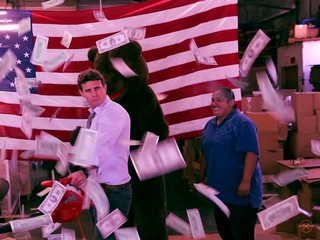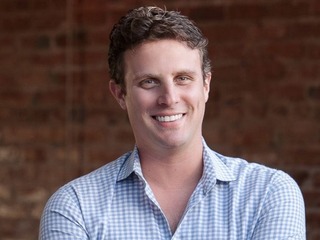
Michael Dubin: success means more than just raising funding
His other big piece of advice: don't go for the big, frothy valuation because you might get burned

At Vator's annual Splash LA event on Thursday, Michael Dubin, founder and CEO of Dollar Shave Club, sat down with Vator CEO Bambi Francisco to discuss his company, how it grew so big so far, and how he is trying to disrupt the grooming industry.
During the conversation, Dubin talked about the origins of the company, and how he was able to raise so much money so quickly. Probably the biggest savings came from the fact that Dubin started out with a warehouse of razors that he didn't have to manufacturer.
"My friend's wife's father was a guy who did a lot of business in Asia, and he had a warehouse of razors and he was like, 'Can you help me sell them on the Internet?' and I said, 'Sure,' and I had the idea for Dollar Shave Club pretty quickly thereafter. I had been working in advertising and e-commerce before so he kind of knew to ask me among our group of friends, and that was very fortuitous," he said.
"But I think the hard work began once we got down to business on building the website and figuring out how we were going to do logistics and I did that, like any founder does, you start by yourself, or maybe with a small group, and figuring out how to do things on a very small level and then perfecting it as you go."
The company was started in Dubin's apartment in early 2011, and they launched the beta site in July of 2012. When it came to the video, and the "modern kind of incarnation of Dollar Shave Club," that was launched in March of that year, but it was shot in October of 2011, and Dubin had been able use the video "to shop the concept around," as well as to help close its Angel round in January 2012, of $100,000, and then close its $1 million seed round in March of 2012.
The company's Series A, which was $10 million, came in October of the same year, in which it saw $4 million in sales.
"The video drove a lot of sales organically, we started spendng a little more money in October, we did a little bit of radio at the end of 2012, but not much, a lot of that 2012 stuff was organic and a little bit of Facebook," Dubin said.
"We think of marketing as an ecosystem, as one must. We think of it as a big funnel, anyone in e-commerce will talk to you about the awareness and conversion funnel. There's really big channels like television and and radio, then there's middle of the funnel channels, like Facebook and radio also, then lower parts of the funnel, which can be Facebook also, and digital or any other type of digital media and we'll just hit with you different messages at different parts of the funnel."
Given Dubin's experience with raising money, Francisco asked him to give advice to other entrepreneurs who are looking to raise funding.
"I'm sure you've had a lot of conversations with a lot of VCs, what were they telling you that you needed to be?" she asked.
"At the seed stage it was all about me and the idea and the market and that;s what you're selling. It's a job interview and somebody is interviewing you to see if you're the kind of person who can bring your idea, if it's a good idea and a big enough market, to life. And to get a sense of what kind of entrepreneur you're gonna be. And that's what you ought to focus on. There's a zillion blog post out there about what makes a good entrepreneur and what you need to focus on and remember that that's what they're going after. Nobody expects you have it all figured out at the seed stage," he said.
"When you get to Series A is a bit of a different bug, and we were fortunate because we gained a lot of notoriety after the first video launched and people were knocking on our door, and we didn't have to do a ton of, we did hit the road because you always want more than one offer if possible, but we were fortunate that were pretty sure that we would get funded eventually. And I think Series A can mean so many different things. It can be $5 million, it can be $3 million, it can be $10 million. It just depends on what kind of company you are, and where the money is going. You gotta be a clear about where the money is going."
When it came to valuation, Dubin said he was also "fortunate to have some folks with me who had raised a lot of money to help me think through the mechanics of valuation."
"I think the only guidance I can give around valuation is don't overvalue yourself, and that's the philosophy we had long before people were talking unicorns and companies not being able to justify their really high valuations," he said.
"You don't want to box yourself in with too high of a valuation, because the next guy's going to come in and say, 'Well, either you deserve that or you don't,' and then you really hope that you do because otherwise you're going to take a down round. Too many entrepreneurs go after the frothy valuation, because it feels really cool and they see raising money as the be all end all of their success and it's not. Raising funds keeps your business alive and it's something to celebrate but that's not the be all, end all."
So, Francisco wanted to know, what was the company's biggest fund raising challenge?
"Fund raising is tough even when you're a great company. Look there's the Snapchat's of the world, who never have a problem raising money, and Uber, those companies are very blessed because they'll never have to knock on any doors. Proactively, the money people are just throwing money at them," he said.
"For most of us you have to work for it. Dollar Shave Club, we spent weeks and weeks on the road, and even with our success people still had doubts. You're always selling your business to VCs, and I think the best thing you can do, if you're lucky enough to have a choice, is to find a VC that believes in what you're doing and supports your vision, because ultimately things will go a little sideways and you'll want people who can persevere with you as you encounter headwind and they have to share your vision."
Thanks to our main sponsors Wilson Sonsini, KPMG, Javelin Venture Partners, Sky Media, Wavemaker, All Good Living Collective, Bread and Butter Wine, and our co-production partner, Bixel Exchange.
Related Companies, Investors, and Entrepreneurs

Michael Dubin
Joined Vator on
Founder and CEO Dollar Shave Club Michael Dubin is a passionate, creative executive & trailblazing brandbuilder.Related News


Michael Dubin: We're not trying to revolutionize the razor

